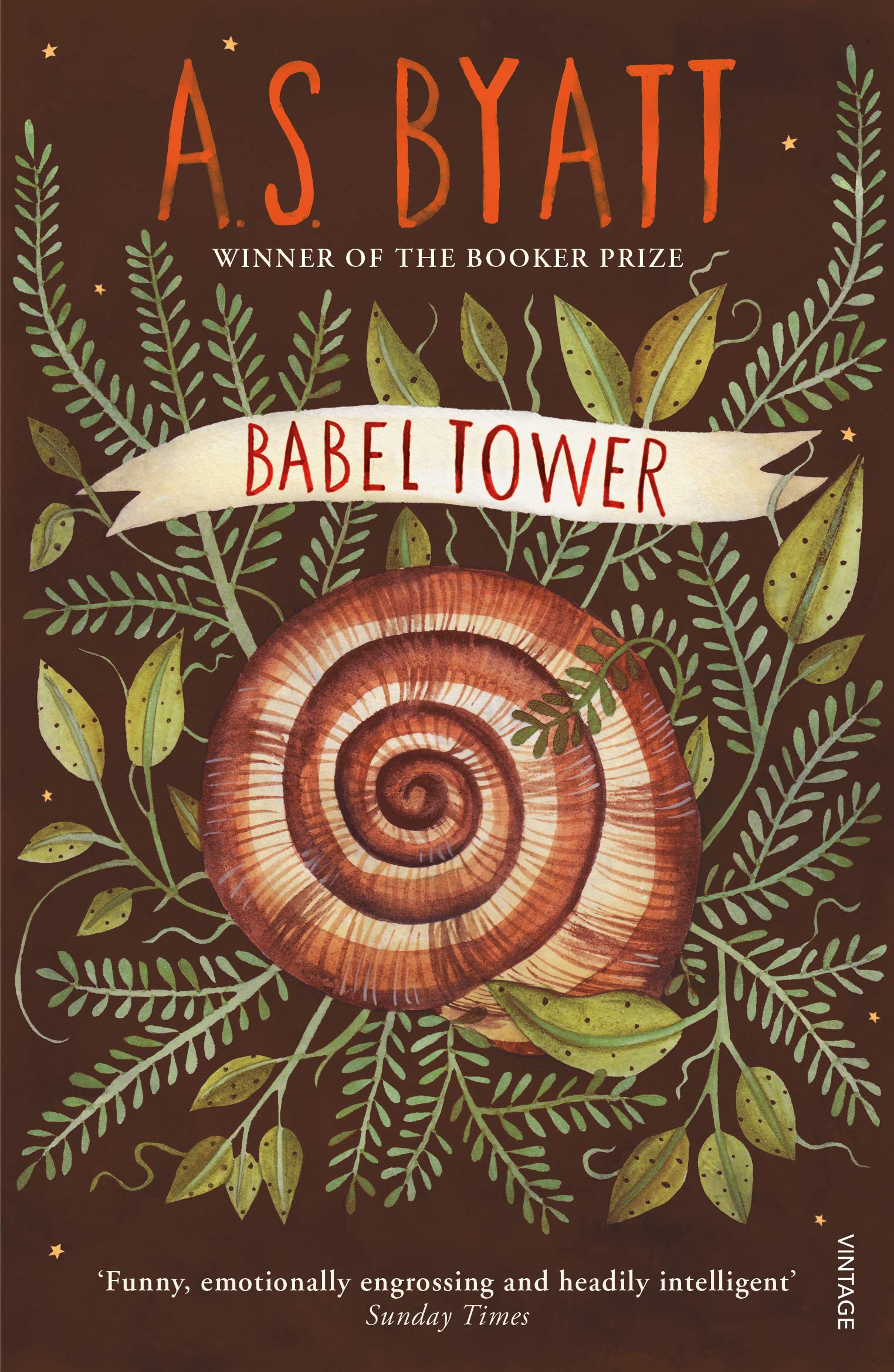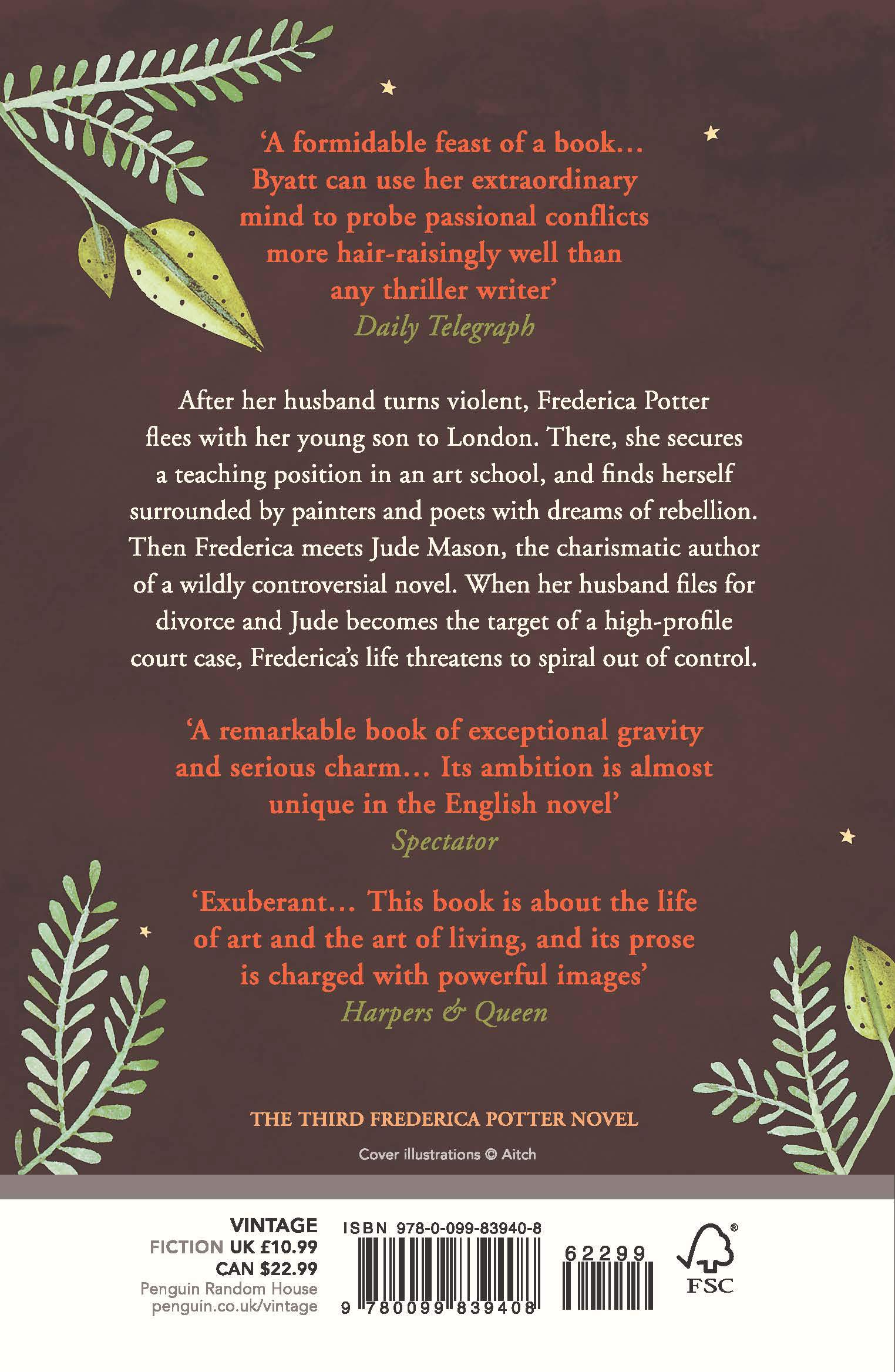


Babel Tower (The Frederica Potter Novels)
S**.
Myths and Thoughts and a Family
I want to begin this review by unashamedly stating that I am destroyed beyond repair by Byatt. A big thing to say but I can't help summing my thoughts and emotions in anything other than this rippling feeling of being taken and tossed over and over. Federica has married a toxic man who provides great sex but is violent and manipulative. She bumps into an old friend from Cambridge while walking in the woods with her 4-year old son, Leo. The friend, Hugh, is shocked to see the clever, intelligent woman reduced to cruel domesticity when she should have been pursuing a PhD in novel-writing and poetry. With that begins a torrid journey toward Federica seeking freedom from the marriage while the pangs of being a mother to her child bog her down. Daniel, on the other hand, is numbed to life in his desolation and feels an anger toward Marcus, who has gone on to gain a doctorate in Mathematics. He is sad and hopeless of life after what he underwent in the previous book. Like the characters, even I was in a similar state of sadness after the turn of events in 'Still Life'. I had not made peace either with what Stephanie, the eldest sister was subject to. In this book, there is another book that goes on parallelly; of a utopic world where a bunch of characters are setting new rules and ways of life in this new, free world following a revolution. Byatt does something so different and magical in this world that had me glued to the book for days on end. I had forgotten my life and its drudgery the whole week as I read the novel at every waking moment. It was like breath I was reaching out to, to live. As she has done before, she had accomplished in investing me into the characters' lives while keeping my brain ready for thought by her erudition. Thought was one of the focal themes of the novel. Federica struggles over fighting to think and the parallel story of the world made me marvel at Byatt's level of thought that had gone into the novel. It is not an easy novel by any means and I can only imagine how much work and reading and time must have gone into writing this book. It demands so much from the reader. To keep their senses open, ready to receive what Byatt has to offer and then to push the reader into cultivating their own thoughts of the story and its characters. In times when ideas of political correctness has become of utmost importance and censorship a big problem in contemporary world, Byatt's revocation of the 'Lady Chatterley's Lover' trial in a renewed form makes the story timely and an urgent read. By the end, I was biting my nails and was on the edge of my seat to know what this debate on censorship and freedom of speech and writing would bring to the novel and the society at large. I know this review has gone on way too long but I don't think I can get over the promise the novel holds and the discussions it raises on matters of cultural, intellectual importance of the times we are living in. Oh, stop me but I can't wait to read the last novel to this series and at the same time I am filled with dread that it is going to be the last and there would not be anymore association with the Potter family! Sigh, such is literature when written after years of research, experience and thought.
R**Y
One of Britain's greatest living writers
This book is excellent - I had previously lent my original copy to a friend who never returned it so this was just a replacement. It arrived on time and I have no complaints. However, if you have not read this series of books, you really should I cannot rate them highly enough.
D**S
Rich And Strange
This is a long and difficult book for a reviewer to tangle with, and I can only do so by breaking it into parts. But, ere I do so, let me make one urgent and important comment for the prospective reader on this, the third book in Byatt's "Yorkshire Tetralogy": THE BOOK IS VERY DISTURBING. Those reviewers here who dismiss it as boring or what not are only exposing their own obtusity, in all sorts of ways. They are in fact demonstrating as true the T.S. Eliot quote from "Burnt Norton" here (p.482) that "human kind cannot bear very much reality." - I, personally, would not trust someone who is not disturbed by this book - Because, as I'll come around to shortly, anyone who is not at first horrified then titillated then horrified at their own titillation in the spectacle of Lady Roseace's death in the book within the book here is simply not a sensitive or aware human being, aware of the cruelty latent in his/her sexuality, whether s/he likes it or not.----And we don't like it, generally. So on to Part1.) The book "Babbletower" within "Babel Tower." - This layering is what makes the book as a whole so thematically powerful. Yes, the character, Jude Mason's, book is in part a rehash of how utopias become dystopias and part a commentary on the Sixties. But, primarily, as in the two previous novels in the tetralogy, it's about human nature, particularly human nature as manifested in sexuality, a theme Byatt doggedly pursues throughout her works. And for Byatt, and for most of us when we consider it, the religious impulse is inextricably intertwined with the sexual. This observation is nothing new. All one has to do is read about the religious rites as practiced by the Ancient Greeks, for example. But it's somehow different when one thinks of one's own religious or spiritual impulses in the modern world. As a church official puts it here: "The Church has ALWAYS been about sex, dear, that's what the problem is. Religion has always been about sex. Mostly about denying sex and rooting it out, and people who are trained to deny something and root it out become obsessed with it, it becomes unnaturally monstrous..." (p.25) Thus, Culvert's discovery of the paintings of the suffering Christ in the tower marks the dawn of his awareness that there is a pleasure, a sexual pleasure, in cruelty. And this discovery leads, ultimately, to the monstrous way in which Lady Roseace is tortured and killed. At first I didn't make too much of this scene, too over the top I thought, but it's difficult to get the imagery and disgust out of one's mind, where it dwells, and eventually one eventually finds oneself responding to it in a sexual manner, because really, of course, as Culvert intended, Roseace's execution is more about sex than death. The moment one undergoes a sexual response in oneself to this horrid imagery and comes to an awareness that part of one takes pleasure in it is the moment one realises what a bewildering and disorienting book this is. Like all literature, it stirs deep things other works leave to convention and causes one to rethink basic assumptions about what one is all about in this world. On to Part2.) Frederica - I don't like her. I like her husband even less. But that's beside the point. The problem with not liking Frederica and her distrust of emotion and her way of trying to think through everything and put everything into "laminations" is that one realises that, to a great extent, the person one truly dislikes is Byatt. But it has to be said for Byatt that she (unlike Iris Murdoch, who draws a moral lesson from her own proclivities in her books and makes them intolerable reading, to me anyway) is fully aware of Frederica's, ahem, her own, shortcomings and shrewdly points them out, which makes Frederica bearable, if not exactly likeable.3.) The book as a whole - Is too full of parody. The scene on the moors where Federica departs her dashing husband is straight out of Wuthering Heights, rescribed for the modern reader. And then parody breaks out all over: Modern poetry, contemporary education, English divorce law proceedings (before no-fault divorces were commonplace) and on and on. The saving grace here is that Byatt parodies her own parodies, making Frederica's "laminations" as much of a shipwreck as her life is at times here, thus making them and her palatable. What the none-too-subtly named Magog says in the trial about the Babbletower is more true of Babel Tower, that, "it is a text that twists round and round itself like the snake around the tree. What IS its true message?" p.586One might well wonder. And go on wondering, for, despite certain reservations on my part, this is a rare book indeed, one not just to think and ponder over, but to WONDER over.
S**L
Enjoyed.
Try it
S**M
Satisfying reading with rich details yet somewhat elusive
Byatt does a good job in lifting a mundane, sordid, humiliating and ugly and yet somewhat ordinary divorce story into a page turner by attempting to elevate the episode into an epic proportion by relying on simultanous narrative of Babeltower, an obscenity book case.
Trustpilot
1 month ago
1 month ago